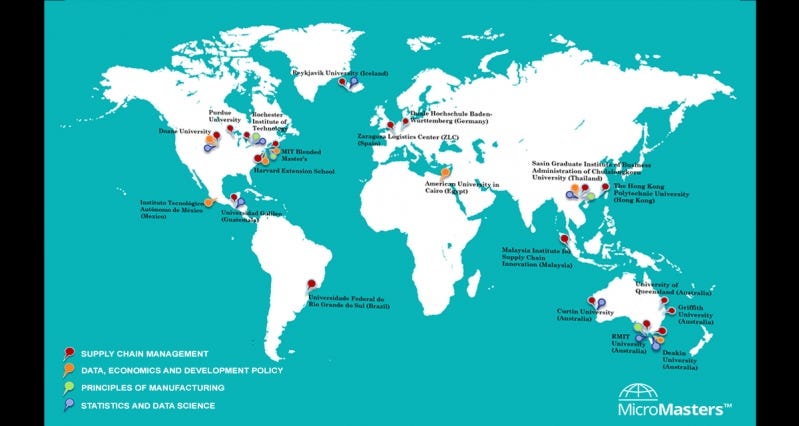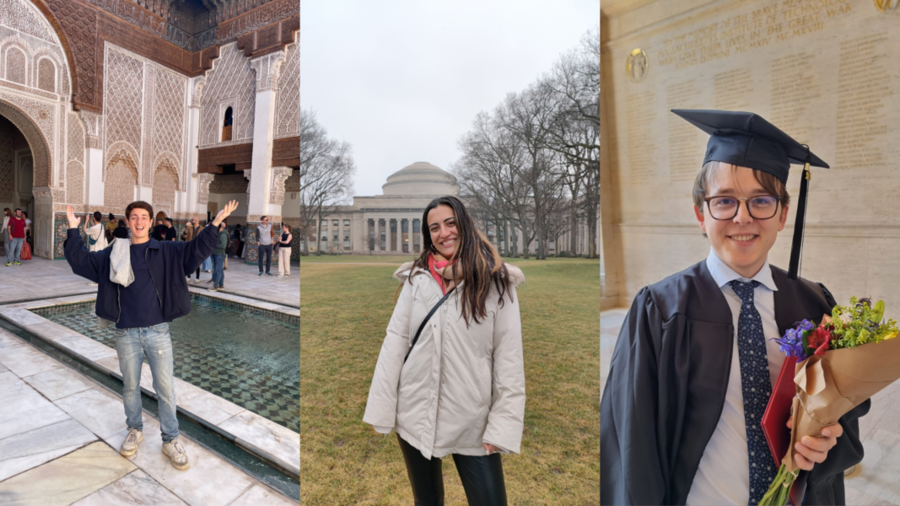On June 18, 609 learners celebrated the completion of MITx MicroMasters programs in Data, Economics, and Development Policy (DEDP), Principles of Manufacturing, and Statistics and Data Science in an online event hosted by MIT Open Learning. With Vice President for Open Learning Professor Sanjay Sarma presiding, the celebration emphasized the credential holders’ tenacity and potential to transform their industries and communities.
This is the first time cohorts from these three programs have been recognized through a completion ceremony, bringing together learners from 82 countries who earned their credentials between 2018 and 2020. Housed at the Office of Open Learning, the MicroMasters programs are created in conjunction with departments, labs, and centers all over MIT: DEDP is offered jointly through the Department of Economics and the Abdul Latif Jameel Poverty Action Lab (J-PAL), Principles of Manufacturing through the Department of Mechanical Engineering, and Statistics and Data Science through the Institute for Data, Systems, and Society (IDSS).
“Learning online requires a lot of self-discipline and perseverance,” notes Esther Duflo, the Abdul Latif Jameel Professor of Poverty Alleviation and Development Economics in the Department of Economics. “You have really achieved something very difficult and quite remarkable, that shows both your talent and your commitment.”
Opening doors, broadening perspectives
The ceremony, like the certificate itself, means something different to each recipient. For some, it’s a private achievement, signaling a mastery of a subject that holds deep personal significance. For others, it’s a momentous step in reaching career goals. Still others view the MicroMasters program as a route toward an education they couldn’t otherwise achieve: 70 percent of DEDP learners, for example, come from middle- to low-income countries.
The MicroMasters learners honored at this year’s ceremony represent a wide variety of professionals at all stages of their careers. David Bruce, a liver transplant surgeon at the Ochsner Clinic in New Orleans, Louisiana, enrolled in the Statistics and Data Science program out of interest in the subject, and is now applying his new knowledge in transplant informatics. Fabio Castro, a learner in Brazil who completed the same program, was inspired to apply for MIT’s PhD program in civil engineering, and he will matriculate in the fall.
Some of the ceremony’s honorees were already avid online learners before beginning their MicroMasters journey. Linxi Wang, a DEDP learner currently based in the United States, described how valuable it is to be connected to a global network of like-minded professionals: “One thing I absolutely love and couldn’t find anywhere else is the friendly community we’ve built.”
Badri Ratnam, who received the Principles of Manufacturing credential this year, had earned upwards of 25 MITx certificates in several subjects, and was thrilled to discover that he could use his learning to advance his engineering career. “When I saw that MITx was offering a mechanical engineering-related MicroMasters, I jumped at the opportunity,” he says. “The value of this program to me is that it helped me understand the challenges in bringing a prototype product to the world — I’m engaged in one such project at work as we speak.” Now having completed his credential, Ratnam hopes to continue his studies, perhaps earning dual degrees in manufacturing and supply chain management.
Many credential holders have been able to apply their knowledge to pressing global issues. Australia-based learner David Fong described how the DEDP program helped inform his work in child development and health-care screening with the nonprofit Spur Afrika in Nairobi, Kenya. Eva Flonner, a learner in Austria, could not have found a more urgent use for her new skills in Statistics and Data Science: “The MIT MicroMasters program really changed my career, since I’m now responsible for data science tasks linked to the corona crisis,” she says.
A new way forward for global education
In addition celebrating the personal achievements of individual credential holders, the ceremony is testament to the possibilities offered by a new way forward in education. MIT launched the MicroMasters program in 2016, the first of its kind in the world. It began as a means of disrupting the traditional admissions process for the master’s degree program in supply chain management: anyone who earned the online credential, requiring the successful completion of a curated suite of MITx courses, would be eligible to finish their degree on campus, without needing to meet any other admissions criteria.
The microcredential model has been replicated at dozens of global universities in recent years, both as an alternate graduate admissions route and as a means of awarding respected professional credentials for high-demand fields. In his remarks, Professor Devavrat Shah, director of MIT’s Statistics and Data Science Center, commented on how much the field of higher education can learn from implementing microcredential programs: “[MicroMasters learners] have become model students for us as we, universities across the globe, grapple with Covid-19 and think about how we deal with blended and online education,” he said.
The MIT MicroMasters program continues to grow, with credentials awarded to 2,852 individual learners in four different disciplines, and with pathways to graduate degrees at collaborating universities around the world. A fifth program, the new MicroMasters in Finance from MIT Sloan School of Management, will begin running courses in September.
David Hardt, professor of mechanical engineering, echoed the sentiments of all the MicroMasters ceremony speakers, expressing a wish that each credential holder will use their new skills and knowledge to become a leader in their field, “someone people will look to” for knowledge and guidance. Remarking on how closely the MicroMasters mirrors the rigor of a residential MIT graduate program, Hardt said, “You’ve done a marvelous thing.”
Says Professor Krishna Rajagopal, dean for digital learning, “This celebration served as an affirmation that amidst so much uncertainty, people can still accomplish great things. I have no doubt that MicroMasters learners will help lead us through these challenging times and into a brighter future.”








































